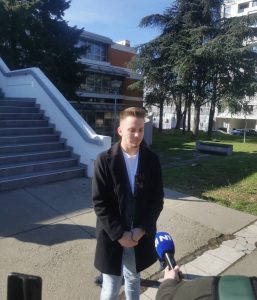The Council of Europe included on the Platform for the Protection of Journalism and the Safety of Journalists (COE platform) a new case of pressure and threats from Serbia that was previously pointed out by the SafeJournalists Network. The case refers to death threats addressed to the N1 newsroom through comments on the website. The second case from Serbia included on the COE platform refers to the accusations of Serbian President Aleksandar Vucic against the Guardian, Bild and FAZ that they are waging a hybrid war against him.
Threats to the editorial office of N1
On February 26, 2024, the newsroom of the N1 channel in Belgrade received death threats in the comments section of its website.
The author wrote: “I will kill you all soon”, with insults and claims that he knows where the journalists live and “what kind of cars they drive”. N1 program director Igor Bozic told the SafeJournalists network that the newsroom has recently been the subject of a large number of threats. “Institutions in charge of protecting the public must be particularly sensitive to journalists who are the voice of citizens. “It’s a small step from threats to physical attack,” he said. The Independent Journalists’ Association of Serbia (IJAS) strongly condemned the threats and called on the authorities to take repressive measures against the perpetrators.
In addition, the SafeJournalists Network reported on the threats previously addressed to the N1 newsroom, which was also included in the COE Platform.
On January 11, 2024, Igor Bozic, program director of the N1 channel, received an email sent for him to the N1 address. It said: “The day will come when you will have bloody heads, your mother is a Nazi, a bastard, a Serb-hater, a traitorous s***.” Two similar emails had already been sent to Bozic a month earlier. The threat was reported to the Special Prosecutor’s Office for high-tech crime on the same day.
Namely, on December 3, 2021, the staff of N1 television received threats via Twitter and email. A post on Twitter called for a raid on the television studio, the interruption of broadcasts and the expulsion of staff, while the email directly threatened N1 employees and their families: “I want to say do not cry over what happened or what is happening to your loved ones.” Threats on the Internet were also sent in connection with the nationwide protests held on December 4.
“A hybrid war”
On February 5, 2024, Serbian president Aleksandar Vucic declared on television that he was a victim of, as he said, a “hybrid war” waged by international newspapers. Referring to articles by the Guardian, Bild and Frankfurter Allgemeine Zeitung (FAZ) on Happy TV, President Vucic called the Guardian a “criminal list” and stated that everything foreign newspapers said and did was “allegedly related to the elections and the state of democracy in Serbia.” , was actually aimed at weakening the country.
The allegations have been vehemently denied. FAZ journalist Michael Martens denied that he had ever written that President Vucic was planning a war the next day in a comment for the N1 channel and said: “It seems to me that the President of Serbia knows very well that there is no hybrid media war against him – at least not by me and Frankfurter Allgemeine Zeitung, but I don’t think from other western media either. I don’t know if this is true for the Russian media as well.”
A Guardian spokesperson told Radio Free Europe (RSE) that President Vucic’s comments were “absolutely unfounded” before reaffirming the paper’s commitment to “fearless, independent journalism that calls out those in power.”
The Platform for the Protection of Journalism and Safety of Journalists is a unique mechanism that facilitates dialogue between governments and journalistic organizations, with the aim of stopping violations of press freedom in the member states of the Council of Europe and allowing journalists to carry out their profession without the risk of endangering their safety.




